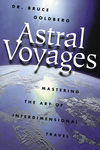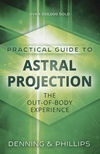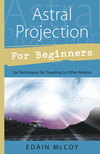Eye Blink Procedure for Astral Projection

The…astral projection strategy called Eye Blink Procedure utilizes eye blinks and innovative orientation techniques designed to induce the out-of-body state and facilitate travel to either physical or non-physical destinations. The procedure, which is based on the research of Gene Chamberlain of the Parapsychology Research Foundation and tested in [their] labs, incorporates remote viewing as a practice exercise into a procedure designed to induce astral projection. Astral projection and remote viewing are similar in that they both provide information concerning spatially distant realities. They are different, however, in that astral projection, unlike remote viewing, incorporates disengagement of the astral body from the physical and usually includes a much wider range of experiences. Once you have developed your remote viewing abilities, astral projection is much easier to master.
It is important to read the entire procedure before starting. The steps are well defined and easy to follow. Here's the procedure.
- The Setting: Select a safe, quiet area that facilitates walking among a variety of items, such as tables, chairs, sofas, appliances, and plants. The typical home setting with living room, dining room, family room, and kitchen connected provides an excellent situation. If a large area is unavailable, a single room or office with space for walking around furnishings is sufficient. The setting should include a comfortable recliner or couch for use during astral projection. Select the specific path you will follow while walking, preferably a circular route that includes a variety of things to view.
- Physically Walking: Walk slowly through the path you selected, paying special attention to what you see on either side.
- Viewing and Eye Blink: After walking through your selected area several times, stop and pick a well-defined object, such as a lamp or vase. Gaze at the object for a few seconds and then snap your eyes shut. Rather than closing them slowly, snap them as you would if blinking. Think of taking a snapshot of the item with your eyes. With your eyes closed, you will note that the afterimage of the object will remain briefly. When the image disappears, open your eyes and repeat the exercise. You will note that when you first start this process, the image may turn negative. This will change with practice.
- Forming Mental Impressions: As you continue to practice Step 3, you will notice that the afterimage of the selected object stays with you longer. As the duration of the image increases, you will note that a mental impression of the image remains for a few moments even after the image itself fades. Developing this awareness requires practice, possibly for several minutes. Test your effectiveness by turning your head to see if the mental impression remains. When the impression of the image remains, you are ready to go on to the next step.
- Walking and Eye Blink: Resume walking around the area you selected as your chosen path. As you continue to walk, repetitively snap your eyes shut for about a second and then open them for about a second while always facing forward. Carefully adjust your eye-blink rate and step so as not to stumble or collide with anything. Upon beginning this routine you will probably see the images in your mind's eye as stationary. After several times around and possibly more than one session, you will notice that when your eyes are shut, the items continue to move so that your eyes can be closed longer before the movement stops. You will know when you have this mastered when the objects you envisioned are adjacent to you when you open your eyes.
- Mental Walking: Having mastered Step 5, find a comfortable place to recline or lie down with your legs uncrossed and your hands resting at your sides. As you relax, make the entire trip mentally with your eyes closed. While mentally walking through your selected space, pay special attention to the familiar details along your pathway. Observe them from different viewpoints as you sense yourself walking among them.
- Remote Viewing: As you remain relaxed with your eyes closed, select a familiar distant place and view it remotely. Pay particular attention to the specific details of the distant setting you are viewing. Take plenty of time for the setting to emerge in full detail.
- Astral Projection: Having remotely viewed a distant setting, you are now ready to travel out of body. With your eyes remaining closed, mentally walk around your selected path once more. View in detail the setting as you move among its furnishings. As you continue this mental exercise, you will begin to sense yourself literally walking out-of-body through the room, maneuvering among pieces of furniture and noticing objects in even greater detail. You will then sense that you can travel out-of-body beyond the room to experience firsthand other surroundings, including the place you remotely viewed in Step 7. You are now ready to walk out the door and travel to that place. Take plenty of time to travel to that place, and once there, add to your awareness such sensations as hearing and touch. Remain in that place long enough to get a full sense of your presence there.
- You can now travel to places you have not physically been before. Note your sense of freedom and control. By intent alone, you can travel in any direction to any location you choose. Your destination can include both physical and spiritual realities. You can travel to familiar distant settings or to places totally unknown to you. You can observe others, including other astral travelers, and possibly interact with them. You can engage the spirit realm, again by intent alone. You can interact with your spirit guides and other entities in the spirit realm. You can experience the magnificent beauty of that dimension and the empowerment resources it offers.
- The Return: To return to your physical body and re-engage it, give yourself permission to first return to the familiar setting you visited earlier, and from there to your physical body at rest. Allow plenty of time for yourself to slip into your body, full re-engaging it. When you notice such sensations as breathing, heart rate, and weight, you will know you are back in your body.
- Resolution and Verification: Take a few moments to reflect on your out-of-body experiences. Explore the relevance of the experiences, particularly your visitations to the spirit realm. Verify as far as possible that what you experienced during astral travel was accurate.
Excerpted From Beyond Reincarnationby Joe H. Slate, PhD
Related Products



is subject to certain Terms and Conditions